We will be closed from 5pm Thursday 17th April for the Easter Bank Holidays, re-opening at 8.30am on Tuesday 22nd April. Any orders placed during this period will be processed when we re-open.

This book tackles the most pressing problems of contemporary free speech law by examining where the idea of free expression came from in the first place, applying the lessons of the past to address the challenges of the present.
Free speech cannot be taken for granted—it needs to be fought for. But its champions will be successful only if they understand what they are defending. For free speech is a deceptively simple principle.
How should it guide us on the bounds of what is acceptable to say? Should we be free to preach hatred, or to spread fear or fake news? Can media freedom be balanced against the right to privacy? How does free speech work online? Can the internet be made a safe space without compromising freedom of expression?
The book offers not just insights but answers to these and other such vital questions by roaming widely over the law of free speech, from English common law to the European Convention on Human Rights via the US First Amendment.
In rescuing free speech from the culture wars in which it has become embroiled, Adam Tomkins restates its values, its complexities, and its enduring importance, in prose that is as passionate as it is clear-sighted. Even-handed, informed and authoritative, this is a major, timely work from one of the UK’s leading constitutional scholars.